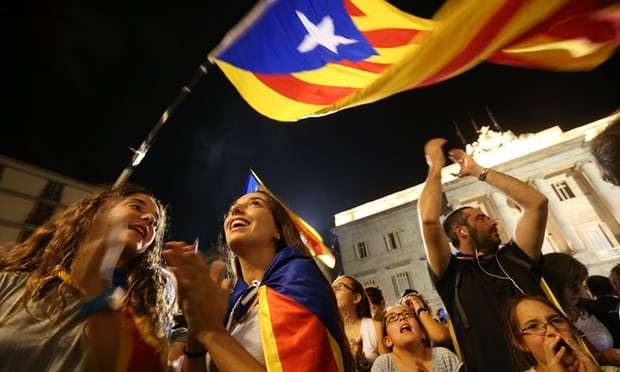Sànchez, a regional MP and former leader of the Catalan National Assembly, is facing sedition and rebellion charges over the part he played in demonstrations in the run-up to the unofficial independence referendumlast October.
In an interview with the Guardian conducted before Pedro Sánchez replaced Mariano Rajoy as prime minister, the Catalan politician called for a complete overhaul of Madrid’s approach to “the most important political crisis” Spain has experienced since its return to democracy following the death of the dictator Francisco Franco.
“The only way to restore democratic and political normality is a paradigm shift,” said Sànchez. “Spain has to exchange the principle of the indisputable unity of the homeland for the principle of the indisputable mandate of the popular will of citizens expressed at the ballot box.”
The Spanish government’s direct control over the region lapsed on Saturday after the new Catalan president, the hardline nationalist Quim Torra, abandoned plans to reappoint jailed or fugitive members of the previous administration.
Catalonia is divided over the independence issue: the overwhelming majority of Catalans want a referendum agreed by the central and regional governments, and the vote called by the ndeposed Catalan president Carles Puigdemont was shunned by unionists. 90% of participants opted for independence on a turnout of 42%.
“We are facing an indisputable democratic challenge,” said Sànchez. “We are debating whether to move towards the 21st century or to cling to the Francoist impositions of the transition [to democracy] which also informed the current constitution when it comes to judicial power, the unity of Spainand the monarchy.”
He lamented the lack of communication between Puigdemont’s government and “the state powers”, calling it “the principle mistake” of recent years. “In politics, even in the worst moments of a crisis, there have to be communication channels,” he said.
“They have ceased to exist in the political conflict in Catalonia and the interlocutors have faded away. We’ve had more than five years of non-existent dialogue and now we’re suffering the consequences.”
A change of tack in Catalonia, he said, would allow the Spanish government to abandon its forceful approach as well as permitting the judicial authorities to “stop violating the political rights of elected people”.
Pedro Sánchez, who relied on the support of the two main Catalan pro-independence parties to depose Rajoy in a no-confidence vote on Friday, has said he will engage in dialogue to try to resolve Catalonia’s “institutional crisis”.
But he said any negotiations would have to abide by the constitution, which stresses the “indissoluble unity of the Spanish nation”.
Jordi Sànchez was one of the candidates whom Puigdemont tried to appoint as a successor but the move came to nothing after Spain’s supreme court refused to allow him out of prison to attend an investiture session.
Amnesty International is among the group’s calling for Sànchez’s release, arguing that his continuing detention is excessive and disproportionate. Sànchez also defended Torra against accusations of anti-Spanish bias that have arisen from his past tweets and articles.
“He’s an affable, discreet person who’s open to dialogue, who holds deep democratic convictions and whose political motivations are based on the right to self-determination,” said Sànchez.
“He doesn’t have much political experience but he’s had a long civic and cultural career. Some of his past words and written opinions are unfortunate, but they represent neither the views nor the traditions of the independence movement, which is solidly rooted in the principles of political liberalism.”
Sànchez said he was in good health but added: “The most difficult thing is seeing how prison is as much of – or more of – a punishment for my children, my partner and my parents.”
Andreu van den Eydne, a lawyer for two other jailed Catalan leaders, the former vice-president Oriol Junqueras and the former foreign minister Raül Romeva, - said his clients were also struggling with the effect their detention was having on their families.
The deposed ministers are also in jail in Madrid under strict conditions that require their families to travel more than 400 miles to see them once a week. Apart from a familial two-hour visit once every three months, the only contact is through glass on a telephone.
Junqueras has been in jail since November despite offerings to hand over his passport and the provision of substantial bail.
“He is adapting, and strong, but suffering. He has two kids: five and seven years old,” Van den Eydne said. “Romeva, with children aged nine and 11, has been in prison for two months, even though he had obeyed all police orders applied to his bail. It is very tough to go to prison, see your father and then say goodbye.”
No full trial is expected to start until the autumn by which time Junqueras will have been in jail for 10 months.
They are facing charges of rebellion, punishable with a prison sentence of 30 years or sedition punishable with 15 years in jail.
The charge of rebellion requires proof of the use of violence, but Van den Eydne said the Catalan independence movement has prided itself on a non-violent approach.
“The charges are based on so little evidence that it feels designed to make the public regard lesser charges of sedition seem fair,” he said. “There was no violence. We are talking about civil rights, and the right to vote, but the prosecution want to reduce the scope of the trial, and we have to make it wider.”
More about: #Catalonia
















































